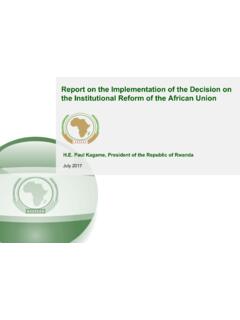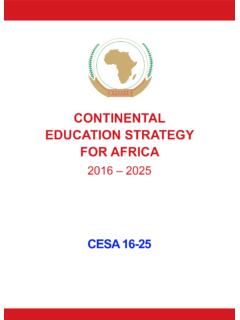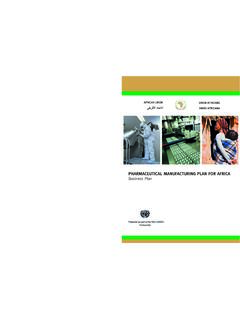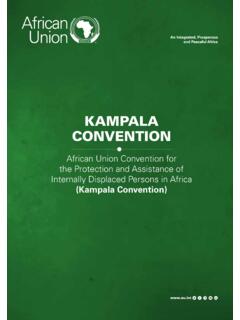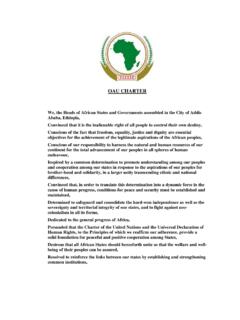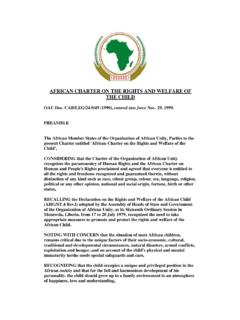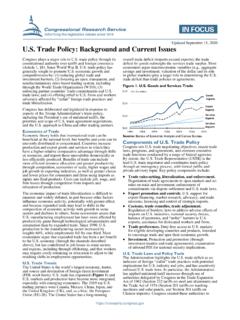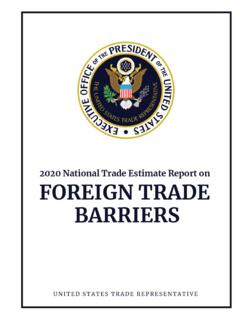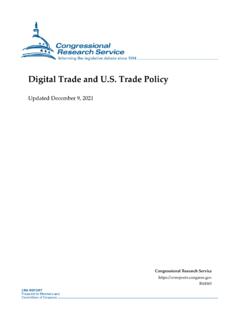Transcription of AGREEMENT ESTABLISHING THE AFRICAN CONTINENTAL …
1 AGREEMENT ESTABLISHING THE AFRICAN CONTINENTAL FREE trade AREA 1 AGREEMENT ESTABLISHING THE AFRICAN CONTINENTAL FREE trade AREA PREAMBLE We, Member States of the AFRICAN Union, DESIROUS to implement the Decision of the Assembly of Heads of State and Government during its Eighteenth Ordinary Session held in Addis Ababa, Ethiopia from 29th-30th January, 2012 (Assembly/AU/Dec. 394(XVIII) of the Framework, Road Map and Architecture for Fast Tracking the establishment of the AFRICAN CONTINENTAL Free trade Area and the Action Plan for Boosting Intra- AFRICAN trade ; COGNISANT of the launch of negotiations for the establishment of the CONTINENTAL Free trade Area aimed at integrating Africa s markets in line with the objectives and principles enunciated in the Abuja Treaty during the Twenty-Fifth Ordinary Session of the Assembly of Heads of State and Government of the AFRICAN Union held in Johannesburg, South Africa from 14-15 June 2015 (Assembly/AU/Dec.))
2 569(XXV); DETERMINED to strengthen our economic relationship and build upon our respective rights and obligations under the Constitutive Act of the AFRICAN Union of 2000, the Abuja Treaty and, where applicable, the Marrakesh AGREEMENT ESTABLISHING the World trade Organization of 1994; HAVING REGARD to the aspirations of Agenda 2063 for a CONTINENTAL market with the free movement of persons, capital, goods and services, which are crucial for deepening economic integration, and promoting agricultural development, food security, industrialisation and structural economic transformation; CONSCIOUS of the need to create an expanded and secure market for the goods and services of State Parties through adequate infrastructure and the reduction or progressive elimination of tariffs and elimination of non-tariff barriers to trade and investment; ALSO CONSCIOUS of the need to establish clear, transparent, predictable and mutually-advantageous rules to govern trade in Goods and Services, Competition Policy, Investment and Intellectual Property among State Parties, by resolving the challenges of multiple and overlapping trade regimes to achieve policy coherence, including relations with third parties; RECOGNISING the importance of international security, democracy, human rights, gender equality and the rule of law, for the development of international trade and economic cooperation; 2 REAFFIRMING the right of State Parties to regulate within their territories and the State Parties flexibility to achieve legitimate policy objectives in areas including public health, safety, environment, public morals and the promotion and protection of cultural diversity.
3 FURTHER REAFFIRMING our existing rights and obligations with respect to each other under other agreements to which we are parties; and ACKNOWLEDGING the Regional Economic Communities (RECs) Free trade Areas as building blocs towards the establishment of the AFRICAN CONTINENTAL Free trade Area (AfCFTA), HAVE AGREED AS FOLLOWS: PART I DEFINITIONS Article 1 DEFINITIONS For the purpose of this AGREEMENT , (a) Abuja Treaty means the Treaty ESTABLISHING the AFRICAN Economic Community of 1991; (b) AGREEMENT means this AGREEMENT ESTABLISHING the AFRICAN CONTINENTAL Free trade Area and its Protocols, Annexes and Appendices which shall form an integral part thereof; (c) Annex means an instrument attached to a Protocol, which forms an integral part of this AGREEMENT ; (d) Appendix means an instrument attached to an Annex which forms an integral part of this AGREEMENT ; (e) Assembly means the Assembly of Heads of State and Government of the AFRICAN Union; (f) AU means the AFRICAN Union; (g) AfCFTA means the AFRICAN CONTINENTAL Free trade Area; (h) Commission means the AFRICAN Union Commission; (i) Constitutive Act means the Constitutive Act of the AFRICAN Union of 2000; 3 (j) CONTINENTAL Customs Union means the Customs Union at the CONTINENTAL level by means of adopting a common external tariff, as provided by the Treaty ESTABLISHING the AFRICAN Economic Community of 1991; (k) Council of Ministers means the Council of AFRICAN Ministers of State Parties responsible for trade ; (l) Dispute Settlement Body means the body established to administer the provisions of the Protocol on Rules and Procedures on the Settlement of Disputes except as otherwise provided in this AGREEMENT .
4 (m) Executive Council means the Executive Council of Ministers of the Union; (n) GATS means the WTO General AGREEMENT on trade in Services of 1994; (o) GATT means the WTO General AGREEMENT on Tariffs and trade of 1994; (p) Instrument unless otherwise specified in this AGREEMENT refers to Protocol, Annex or Appendix; (q) Member States means the Member States of the AFRICAN Union; (r) Non-Tariff barriers means barriers that impede trade through mechanisms other than the imposition of tariffs; (s) Protocol means an instrument attached to this AGREEMENT , which forms an integral part of the AGREEMENT ; (t) RECs means the Regional Economic Communities recognised by the AFRICAN Union, namely, the Arab Maghreb Union (UMA); the Common Market for Eastern and Southern Africa (COMESA); the Community of Sahel-Saharan States (CEN-SAD); the East AFRICAN Community (EAC); the Economic Community of Central AFRICAN States (ECCAS); the Economic Community of West AFRICAN States (ECOWAS); the Intergovernmental Authority on Development (IGAD) and the Southern AFRICAN Development Community (SADC); (u) Secretariat means the Secretariat established pursuant to Article 13 of this AGREEMENT ; (v) State Party means a Member State that has ratified or acceded to this AGREEMENT and for which the AGREEMENT is in force; 4 (w) Third Party means a State(s) that is not a party to this AGREEMENT except as otherwise defined in this AGREEMENT ; and (x) WTO means the World trade Organization, as established in terms of the Marrakesh AGREEMENT ESTABLISHING the World trade Organization of 1994.
5 PART II ESTABLISHMENT, OBJECTIVES, PRINCIPLES AND SCOPE Article 2 Establishment of the AFRICAN CONTINENTAL Free trade Area The AFRICAN CONTINENTAL Free trade Area (hereinafter referred to as the AfCFTA ) is hereby established. Article 3 General Objectives The general objectives of the AfCFTA are to: (a) create a single market for goods, services, facilitated by movement of persons in order to deepen the economic integration of the AFRICAN continent and in accordance with the Pan AFRICAN Vision of An integrated, prosperous and peaceful Africa enshrined in Agenda 2063; (b) create a liberalised market for goods and services through successive rounds of negotiations; (c) contribute to the movement of capital and natural persons and facilitate investments building on the initiatives and developments in the State Parties and RECs; (d) lay the foundation for the establishment of a CONTINENTAL Customs Union at a later stage; (e) promote and attain sustainable and inclusive socio-economic development, gender equality and structural transformation of the State Parties.
6 (f) enhance the competitiveness of the economies of State Parties within the continent and the global market; (g) promote industrial development through diversification and regional value chain development, agricultural development and food security; and 5 (h) resolve the challenges of multiple and overlapping memberships and expedite the regional and CONTINENTAL integration processes. Article 4 Specific Objectives For purposes of fulfilling and realising the objectives set out in Article 3, State Parties shall: (a) progressively eliminate tariffs and non-tariff barriers to trade in goods; (b) progressively liberalise trade in services; (c) cooperate on investment, intellectual property rights and competition policy; (d) cooperate on all trade -related areas; (e) cooperate on customs matters and the implementation of trade facilitation measures; (f) establish a mechanism for the settlement of disputes concerning their rights and obligations; and (g) establish and maintain an institutional framework for the implementation and administration of the AfCFTA.
7 Article 5 Principles The AfCFTA shall be governed by the following principles: (a) driven by Member States of the AFRICAN Union; (b) RECs Free trade Areas (FTAs) as building blocs for the AfCFTA; (c) variable geometry; (d) flexibility and special and differential treatment; (e) transparency and disclosure of information; (f) preservation of the acquis; (g) Most-Favoured-Nation (MFN) Treatment; (h) National Treatment; (i) reciprocity; 6 (j) substantial liberalisation; (k) consensus in decision-making; and (l) best practices in the RECs, in the State Parties and International Conventions binding the AFRICAN Union. Article 6 Scope This AGREEMENT shall cover trade in goods, trade in services, investment, intellectual property rights and competition policy. Article 7 Phase II Negotiations 1. In pursuance of the objectives of this AGREEMENT , Member States shall enter into Phase II negotiations in the following areas: (a) intellectual property rights; (b) investment; and (c) competition policy.
8 2. The negotiations referred to in paragraph 1 of this Article shall commence after the adoption of this AGREEMENT by the Assembly and shall be undertaken in successive rounds. Article 8 Status of the Protocols, Annexes and Appendices 1. The Protocols on trade in Goods, trade in Services, Investment, Intellectual Property Rights, Competition Policy, Rules and Procedures on the Settlement of Disputes and their associated Annexes and Appendices shall, upon adoption, form an integral part of this AGREEMENT . 2. The Protocols on trade in Goods, trade in Services, Investment, Intellectual Property Rights, Competition Policy, Rules and Procedures on the Settlement of Disputes and their associated Annexes and Appendices shall form part of the single undertaking, subject to entry into force. 3. Any additional instruments, within the scope of this AGREEMENT , deemed necessary, shall be concluded in furtherance of the objectives of the AfCFTA and shall, upon adoption, form an integral part of this AGREEMENT .
9 7 PART III ADMINISTRATION AND ORGANISATION Article 9 Institutional Framework for the Implementation of the AfCFTA The institutional framework for the implementation, administration, facilitation, monitoring and evaluation of the AfCFTA shall consist of the following: (a) the Assembly; (b) the Council of Ministers; (c) the Committee of Senior trade Officials; and (d) the Secretariat. Article 10 The Assembly 1. The Assembly, as the highest decision-making organ of the AU, shall provide oversight and strategic guidance on the AfCFTA, including the Action Plan for Boosting Intra- AFRICAN trade (BIAT). 2. The Assembly shall have the exclusive authority to adopt interpretations of this AGREEMENT on the recommendation of the Council of Ministers. The decision to adopt an interpretation shall be taken by consensus. Article 11 The Composition and Functions of the Council of Ministers 1.
10 The Council of Ministers is hereby established and shall consist of the Ministers responsible for trade or such other ministers, authorities, or officials duly designated by the State Parties. 2. The Council of Ministers shall report to the Assembly through the Executive Council. 3. The Council of Ministers shall within its mandate: (a) take decisions in accordance with this AGREEMENT ; (b) ensure effective implementation and enforcement of the AGREEMENT ; (c) take measures necessary for the promotion of the objectives of this AGREEMENT and other instruments relevant to the AfCFTA; 8 (d) work in collaboration with the relevant organs and institutions of the AFRICAN Union; (e) promote the harmonisation of appropriate policies, strategies and measures for the effective implementation of this AGREEMENT ; (f) establish and delegate responsibilities to ad hoc or standing committees, working groups or expert groups; (g) prepare its rules of procedure and those of its subsidiary bodies created for the implementation of the AfCFTA and submit them to the Executive Council for approval.
